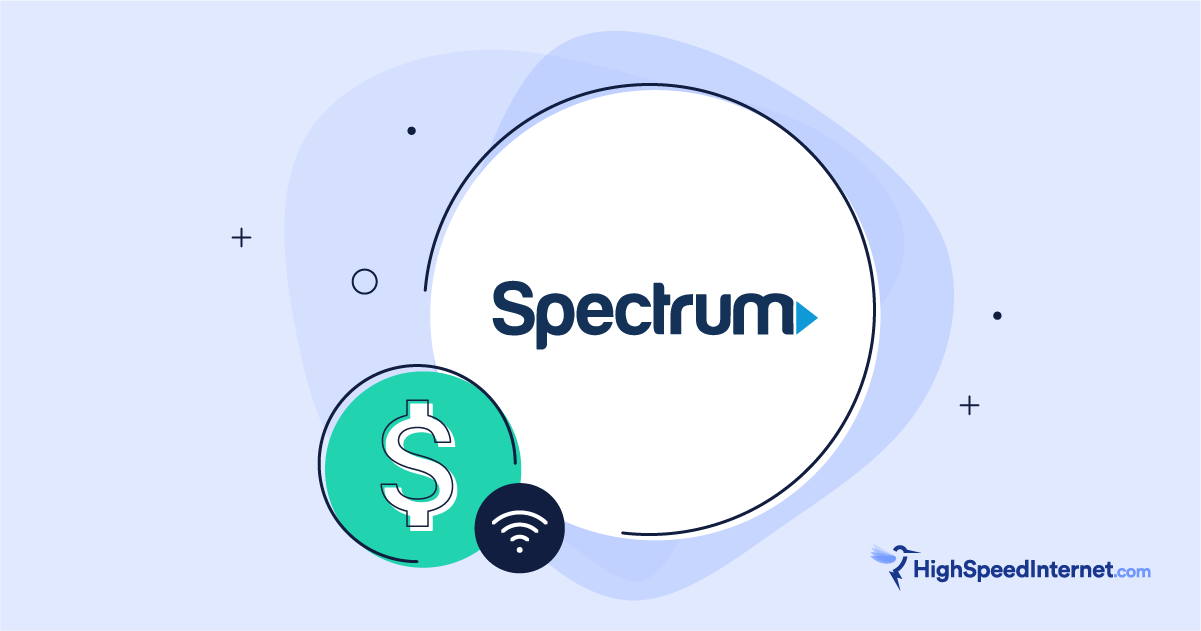What Do You Actually Pay for Cox Internet?
Know what fees to expect with every monthly bill
Feb 13, 2026 | Share
Brand Guides, Internet Buying Guides
Cox charges the same rates it advertises for internet service, but may add taxes and surcharges after the fact.
Cox internet bills are easy to understand, and the company guarantees rates on most plans for two years. However, Cox (like many other providers) still finds ways to charge more than customers expect.
After two years, your monthly price could go up by $10–$20 per month, for starters, and you could see a new $15 equipment fee on your bill at that time. However, there are no contracts to worry about unless you bundle with TV.
It’s not bad! But there are a few things you need to know about credit checks, data caps, and equipment costs in year three. Let’s get into it.
On this page:
Your first bill | Your monthly bill | Fees on mobile and TV | Deals | Rate hikes | How Cox compares | Our verdict on Cox pricing | FAQ
On this page:
- Your first bill
- Your monthly bill
- Fees on mobile and TV
- Deals
- Rate hikes
- How Cox compares
- Our verdict on Cox pricing
- FAQ
Your first Cox bill
You will get your first Cox bill within 24 hours of installation, and you can access it online or in the Cox App. Cox bills in advance, but you have three weeks before the payment is due. There is no penalty (or discount) for signing up for EasyPay.
If you had a professional installation, you’ll see an extra $100 charge on your first bill. You may also be charged a deposit fee for any equipment you’re renting if you fail a mandatory credit check. Watch for taxes and surcharges too.
Shopping for internet service?
Enter your zip code to compare and save.
Your monthly Cox internet bill
Cox offers prepaid internet service, so you can expect your bill around the same day of the month your service was installed.
In addition to your monthly service charges plus taxes, you may notice surcharges for the following, according to the customer service agreement:
- Federal Universal Service fees
- FCC Access Fees
- Network interface fees
- Network access charges
- Any other regulatory and administrative costs Cox incurs
You may see a few fees for optional services too:
- A $15 monthly fee for Panoramic Wi-Fi equipment rental (if you’ve been a customer for longer than two years)
- Data overage charges of $10/GB (if you exceed your 1.28TB data allowance)
- A one-time charge for the cost of a Pro Connect or service call
- Charges for other add-ons, such as Cox Complete Care, streaming services, security services, or rental of the Contour Stream Player
- Charges for returned payments and late fees
There are no longer any cancellation charges on internet, but you may get hit with a big bill if you cancel a TV contract early or if you fail to return your Cox equipment after you end your service.
Billing for other Cox services
You can add TV service to your Cox internet service through either a $5 monthly streaming box or a traditional package with 140+ channels. If you do, you may trigger a 12-month contract.
You may also be able to add voice service and HomeLife home security services from Cox, but those services aren’t available everywhere.
If you bundle your internet service with TV and traditional phone service from Cox, you’ll get one total bill for the combined services, with a breakdown later on. If you also bundle with mobile, though, you’ll see a separate bill and may have a different due date.
If you bundle, you can expect TV and mobile charges that are a little higher than advertised prices.
Additional fees on TV bills from Cox:
- Broadcast surcharge
- Regional sports surcharge
- Taxes and surcharges
Additional fees on voice and mobile bills from Cox:
- Device charges and credits
- Fees for features and services
- Telecommunications relay service fees
- Carrier cost recovery fees
- Subscriber line charges
- Taxes and surcharges
Cox internet plans and prices
Cox offers fast, reliable cable internet. In fact, the company was our winner for fastest internet provider of 2024.
The Fast plan, which comes with download speeds up 300Mbps, is a great fit for households with one or two internet users. If you have a bigger home or need to do a lot of uploading, the Go Even Faster plan may be a better fit.
We don’t usually recommend plans with gig or multi-gig speeds, but if you have the need for that kind of speed, Cox’s Go Super Fast and Go Beyond Fast plans are reasonably priced.
Most people won’t need unlimited data either. But if you do, you can add it for $40 per month for the first two years. After that, all-you-can-eat data will run you $60 per month.
-
Best budget planFast
- Price: $55/mo.*
for 24 mos. - Speeds: Up to 300Mbps
- Data limit: 1.28TB
- Price: $55/mo.*
-
Best family planGo Even Faster
- Price: $85/mo.*
for 24 mos. - Speeds: Up to 500Mbps
- Data limit: 1.28TB
- Price: $85/mo.*
-
Best plan for large homesCox Go Super Fast
- Price: $100/mo.†
for 24 mos. - Speeds: Up to 1,000Mbps
- Data limit: 1.28TB
- Price: $100/mo.†
Data as of 01/13/2026. Prices and fees vary by region and are subject to change.
See disclaimers.
How to save money on Cox internet
You can save $14.95 every month by bundling Cox mobile and Cox internet service, but there aren’t many discounts for bundling with TV service. You could also add home security and home phone service, but you still won’t see discounted pricing.
It’s worth noting that if you bundle internet and TV or add a $5 monthly streaming box to your plan, you may be locked into a contract with an early termination fee. Internet-only plans are now contact-free.

|
| Get the Deal for Cox Communications |
Recent Cox rate changes
Cox doesn’t change prices very often, but it only recently stopped requiring contracts on internet-only plans. It’s a nice change!
The company will add $10–$20 to your monthly plan price after your first two years, but it says so upfront. You’ll see equipment charges starting in year three too.
The price increases don’t meet our definition of a true price hike, but they’re a good reason to shop for internet service about once a year.
How Cox compares
Cox is the third-largest cable internet and TV provider in the U.S., and it competes against providers of multiple internet tech types: satellite, DSL, 4G LTE/5G fixed wireless, and fiber.
Compared to satellite or DSL internet providers, like Starlink, Hughesnet, Viasat, and CenturyLink, Cox is cheaper, faster, and more reliable.
When you stack Cox and T-Mobile Home Internet side by side, there are fewer differences. You’ll get speeds that are a little slower and less reliable with T-Mobile, but prices are about the same. The biggest difference is straightforward pricing: with T-Mobile, you pay almost exactly the advertised price, but Cox’s advertised price is before fees and taxes—and you’ll have equipment costs in year three.
If your choice is between Cox and one of its biggest fiber competitors, Verizon Fios or Quantum Fiber, go with fiber. There are fewer pricing shenanigans, much faster upload speeds, and no congestion-based slowdowns.
Here’s a look at plans and prices.
| Plan | Price | Download speeds up to |
|---|---|---|
| Cox Go Fast | $55/mo.* for 24 mos. | 300Mbps |
| T-Mobile Rely Home Internet | $50/mo.† w/ AutoPay, plus taxes & fees. | 498Mbps |
| Verizon Fios 300 Mbps | $49.99/mo. w/ Auto Pay‡ | 300Mbps |
| Quantum Fiber 500 Mbps | $50.00/mo.§ | 500Mbps |
Prices as of 02/13/2026. Offers and availability may vary by location and are subject to change.
See disclaimers.
Read more about Cox and its rivals
Ready to switch internet providers?
Compare and save by entering your info below.
Our verdict on Cox internet pricing
Cox has simplified its pricing, but I don’t love it’s two-year price guarantees because they’re really just promotional prices that expire after two years. That said, Cox offers great download speeds for the money and does well in customer satisfaction.
If you don’t have a fiber internet option in your area but can get Cox, we think you’ll be happy with the service. As you decide, it may help to browse our expert library:
FAQ about Cox billing
Why is Cox charging me so much?
How much does Cox internet cost by itself?
Does Cox raise prices on home internet?
What charges appear on my Cox internet bill?
Disclaimers
Cox Internet plans and prices
*Cox Go Faster, Go Even Faster, and Go Beyond Fast
Available in select markets only. No annual contract or cancellation fees.
†Cox Go Super Fast
No Term Agreement. 2 Year Price Guarantee. Pricing, packages, and policies are subject to change, including when adjusting or removing services or equipment. Prices do not include applicable taxes, surcharges, usage-based charges (such as data, toll usage, pay-per-use service), and other fees. After any promotional period, regular rates apply (see www.cox.com).
How Cox compares
*Cox Go Faster
Available in select markets only. No annual contract or cancellation fees.
† T-Mobile 5G Home Internet Unlimited
w/ Auto Pay. Regulatory fees included in monthly price for qualified accounts. See full terms.
‡ Verizon Fios 300Mbps
Price per month with Auto Pay & without select 5G mobile plans. Consumer data usage is subject to the usage restrictions set forth in Verizon’s terms of service; visit: https://www.verizon.com/support/customer-agreement/ for more information about 5G Home and LTE Home Internet or https://www.verizon.com/about/terms-conditions/verizon-customer-agreement for Fios internet.
§ Quantum Fiber 500 Mbps
Limited availability. Service rate in select locations only. Taxes and fees apply. New Quantum Fiber Customers Only.
Author - Chili Palmer
Chili Palmer covers home tech services, with a special focus on understanding what families need and how they can stay connected on a budget. She handles internet access and affordability, breaking news, mobile services, and consumer trends. Chili’s work as a writer, reporter, and editor has appeared in publications including Telecompetitor, Utah Business, Idaho Business Review, Benton Institute for Broadband & Society, and Switchful.com.
Editor - Jessica Brooksby
Jessica loves bringing her passion for the written word and her love of tech into one space at HighSpeedInternet.com. She works with the team’s writers to revise strong, user-focused content so every reader can find the tech that works for them. Jessica has a bachelor’s degree in English from Utah Valley University and seven years of creative and editorial experience. Outside of work, she spends her time gaming, reading, painting, and buying an excessive amount of Legend of Zelda merchandise.




